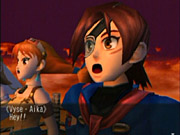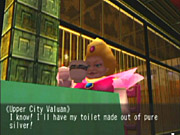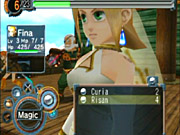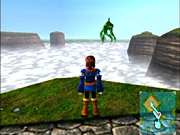The traditional console role-playing game so far has not made much of an appearance on the GameCube. Those looking for some standard RPG gameplay have had only one option. Well, now they have two, and like its solitary peer Evolution Worlds, Skies of Arcadia Legends is a remake of Dreamcast source material--though of the two, Legends originates from a more polished game. RPG fans who never got a chance to try the original are in for an engaging (though somewhat superficial) storyline with many great characters and some unique bits of gameplay as well. Those who fondly remember the original should beware though: One particular idiosyncrasy of the original--the overabundance of random battles--may overpower both the nostalgia factor and the relative dearth of new content.

The story is set in a different sort of world, where people live on floating islands high in the sky above a planet covered by an impenetrable layer of storms. Travel between islands is accomplished by paddle, sail, and screw, in boats kept floating in the sky by rocks that fall from six different-colored moons that also are the source of power for weapons and magic. There's a different sort of magic in the world too, and it inspires a man to don an eye patch, grab a moonstone cutlass, and call people "matey." Yes, the skies are alive with the sound of pirates. You play as Vyse, a young Blue Rogue (the Robin Hoods of the air pirate community), and the story begins when an average raid on one of the ships of the decadent Valuan Empire turns into a foiling of the kidnapping of a strangely dressed, soft-spoken girl.
In addition to embracing the "mysterious girl who's good at magic" cliché, the plot, while hole-free and adventure-filled, is shamelessly immature with hyperbole, which isn't as much of a negative aspect as it is a concession to a younger audience. The regions of the map are distinctly Balkanized, from the Aztec-like Ixa'taka to the Asian Yafutoma. While it's to be expected for a world that's a collection of islands, the demarcation between cultures still seems very exaggerated, as if stereotypes were a rule and not a norm. Visits to the Valuan Empire are the most outlandish, though. The capital, Valua, built along a cave wall and divided into Upper Valua and Lower Valua, with no middle class, only a huge palace in between, comes off like Marx and Engels' worst nightmare. The poor people relate horror story after horror story about their oppression, while the rich people talk only about installing silver toilets to go with their gold bathtubs. There's little believability and even less subtlety. The same goes for the distinctions between the good guys and the bad guys. With the exception of one character, Belleza, the villains are all rotten to the core, and the good guys are all complete saints and nearly infallible; there are absolutely no foibles either way. For all the broad strokes it uses, though, it's still a decent and not at all run-of-the-mill story.

While the characters are an either/or prospect from a morality standpoint, there's quite a spectrum of the standard outrageous personalities and designs that console RPG fans have come to expect. In this respect, the game doesn't disappoint. There's a multitude of standout characters, along with the cookie-cutter town inhabitants and shopkeepers, and the art style for the character design is as distinctive as the game's airborne backdrop. As is often the case with a large cast, characters typically have a one-note distinctive personality trait, but they're all well-played notes, and the dialogue flows smoothly, though sometimes predictably. Dialogue and action scenes play out with just a few canned facial expressions, but the scripters block the scenes well, and the body-language animations avoid looking as reused as the facial expressions. However, there is one jarring device, and that's the voice acting, or rather the sporadic interjections of voice that are supposed to enhance the mood but come off more like a needless reminder that there isn't any voice acting. For instance, if Vyse has a piece of dialogue where he agrees with another character, a sound of him saying "uh-huh" will play when the text comes on screen, without any lip-synching. There are fewer than five of these canned sounds for a character, if he or she has any at all, and they may as well have just been left out.
If there's anything at all that's truly annoying about the game and not just a minor gripe or a relatively small matter of taste, it's combat--or rather one aspect of combat: There's way too much of one type and not enough of another. On one hand, there is the ship-to-ship combat, which features great plot-driven encounters with little in the way of random encounters. Even if it gets slightly drawn out as the ships slowly maneuver through each four-part turn after you issue commands, it's still an interesting fight. But it's almost like a minigame, because on the other hand, there's the standard party-vs.-random-enemy combat. Random combat happens at intervals much shorter than in the average RPG. In interviews prior to the release of Legends, the producers of the game had said that the frequency of such random combats was going to be toned down, because it was the major complaint about the original--but it hasn't been toned down at all. Near the beginning of the game Vyse says that his goal is to explore the whole world. It's even one of the objectives of the game to find "discoveries" on the world map. But when you're interrupted every few seconds to fight, it certainly is less of an adventure and more of a chore, especially since it's easiest either to use one particular special move with its accompanying extended animation (though you can skip these) or to just run away. Particularly, gamers looking at Legends as a chance to replay the original and see the new additions may find this aspect of the game a little too hard to swallow the second time around, since it definitely will consume more of your game time than the new content will.

The addition of "Legends" to the title is to signify that it's not just a port of the original Dreamcast game, but rather it's a port with extra content. It's mostly a port, though. The plot has no major changes. The biggest changes are the addition of some new nonplayer characters. The Sailors' Guild now offers bounties on pirates in addition to the old reward system for discoveries. Some of the pirates are the same ones you fought in the original, and some are new for this version. A new subquest has been added that makes good use of the first-person view mode, which wasn't very useful in the original. Most everything else remains unchanged, though. Levels are the same, and the old characters are the same except for a few additional polygons. That's fine, since the original game looked great. As a port, there's one major problem, though: On GameCube hardware, the mip-mapping bias of the game's renderer causes a very noticeable band of blurry textures in situations like walking down hallways. The area surrounding the character will look fine, and further down the hallway will look fine, but in between there is a blurry portion that walks down the hallway with you. Sound mixing also leaves a bit to be desired.

Skies of Arcadia Legends is a game of almosts. The novelty of the setting is almost enough to make up for the simplistic, even caricatured plot development. The detailed, inventive art style and smooth animations are almost enough to completely distract from the poorly retuned texturing. The highly numerous random battles are almost enough to drive you crazy. What ultimately defines an RPG, though, is its characters, and this is where the game remains blemish-free, with a large cast of memorable heroes and villains. The exploration and bounty rewards, plus the ship-to-ship combat, are also great uses of the game's setting. It's almost an excellent game, and that's still pretty good.